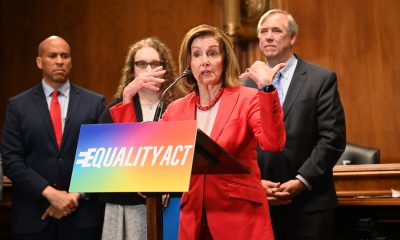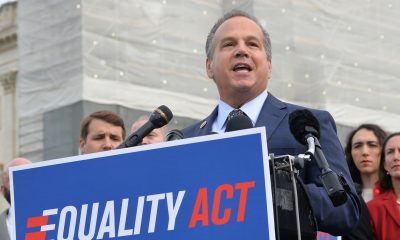National
A fourth openly gay member of Congress?
Democrat Cicilline faces Tuesday primary in R.I.

David Cicilline, the gay mayor of Providence, R.I., is seeking a U.S. House seat in this year’s election. (Photo courtesy of Cicilline Committee)
A gay Rhode Island politician running for Congress faces a major hurdle next week in his bid to represent the Ocean State in the U.S. House.
David Cicilline, the mayor of Providence, R.I., is facing a primary on Tuesday that will determine who will carry the Democratic banner in the general election to represent Rhode Island’s 1st congressional district and potentially succeed retiring Rep. Patrick Kennedy (D-R.I.) in Congress.
Should Cicilline win the primary and later the general election, he would become the fourth sitting openly gay member of Congress.
In a statement provided to the Blade, Cicilline said he’s “working hard every single day” to reach out to voters in the district he wants to represent.
“We are running a strong grassroots campaign with many volunteers knocking on doors, making phone calls and reaching out to voters more and more each day,” he said. “We are going to continue doing this from now until the election on Sept. 14.”
Cicilline is enjoying considerable support from the LGBT community in his bid for a U.S. House seat not only because he’s gay but also because he’s been supportive of the LGBT community in the past.
Kathy Kushnir, executive director of Marriage Equality Rhode Island, said Cicilline has been a steadfast supporter of same-sex marriage and other LGBT causes in his position as mayor and earlier as a state lawmaker.
“As mayor of the city of the Providence, he has always supported equal rights and he’s supported marriage equality and done everything that he can to make sure that all couples, all families are treated equally in the city of Providence,” she said. “We would love to see him do his good work wherever he goes.”
Among the national LGBT groups that have endorsed Cicilline are the Gay & Lesbian Victory Fund and Human Rights Campaign.
Robin Brand, deputy executive director of the Victory Fund, said Cicilline is “doing very well” as he approaches his primary.
“He’s working very hard; he’s raised a very competitive amount of money,” she said. “We are feeling that he’s in a very strong position going into Sept. 14.”
Cicilline’s main opponent in the primary is William Lynch, former head of the Rhode Island State Democratic Party. Other candidates in the running are Anthony Gemma, a businessman, and David Segal, a Rhode Island State House member.
Brand said primary results are sometimes hard to predict because turnout is often unpredictable, so Cicilline’s chances next week will depend on the ground game of getting out supporters.
“You’re also trying to message to a relatively small number of voters,” she said. “A lot of times, primary campaigns are really driven by endorsements and by personal connections to the community.”
But Cicilline has a number of factors in his favor as he enters the Democratic primary. A poll published last month by Brown University found the Providence mayor leading in the pack of Democratic candidates.
According to the poll, 32 percent said they would vote for Cicilline while 15 percent would support Lynch, 11 percent would support Gemma and 5 percent would support Segal.
Still, a number of votes could be up for grabs. In the poll, 35 percent of respondents identified as undecided.
Cicilline has also been a powerhouse fundraiser whose war chest dwarfs other Democratic opponents in the race.
According to the most recent Federal Election Commission reports, Cicilline has raised $1.16 million for his campaign and has more than $900,000 in cash on hand.
Comparatively, Lynch has raised $286,000, Gemma has raised $240,000 and Segal has raised $144,000.
Brand said both the poll and the fundraising numbers “absolutely” bode well for Cicilline as the primary approaches.
“You’d rather be ahead than behind, especially if we’re talking significant spread margins, which have been demonstrated not only in the fundraising, but also in the polling,” she said.
But Brand said the Cicilline campaign is “taking nothing for granted” despite these numbers and has “been building a strong field organization for months” in anticipation of the primary.
Still, Cicilline’s opponents are hammering on the problems facing Providence during his stewardship of the city as mayor, such as underperforming schools and high unemployment.
In a radio debate on Aug. 18, Gemma said Providence was in “shambles” and said Cicilline is not fit to serve in Congress, while Lynch said city schools are a “disaster,” according to the Associated Press.
Cicilline didn’t attend Wednesday’s debate reportedly because it was held during the “Buddy Cianci Show.” The show’s host, Cicilline’s predecessor as mayor, served time in federal prison for corruption.
In response to these criticisms, Brand said the situation in Rhode Island isn’t different from many other places that are facing economic problems.
“The frustration that voters are feeling about the state of the economy is happening across the country,” she said. “I think what voters are looking for is strong leaders, and David Cicilline is a strong leader.”
Brand said the Victory Fund hasn’t seen Cicilline’s Democratic challengers employ anti-gay campaign tactics in an attempt to derail the candidate in the primary.
Whoever wins the Democratic primary is likely to face in the general election GOP candidate John Loughlin, a Rhode Island Assembly member and Army veteran.
Even though the winner of the Sept. 14 primary would be running in a Democratic safe seat, Brand said Cicilline is “keeping a very close eye” on the general election.
“It is Patrick Kennedy’s seat and they kind of have hired the Scott Brown team to try and challenge him in the general, but I believe Mayor Cicilline performs strongly, which I expect he will, that’s going to position him well for holding that seat in November,” Brand said.
Besides the primary in Rhode Island, other openly LGBT candidates are facing elections on Tuesday and could achieve milestones with their wins.
In New York, two non-incumbent candidates are running for Democratic nominations to pursue seats in the State Assembly: Harry Bronson and Philip LaTessa, who are both small business owners.
Brand said the election of those candidates could have a bearing on the fight to win same-sex marriage in the Empire State.
“We’ve all been watching the marriage battle there very closely,” Brand said. “To increase the number of LGBT legislators able to work on that issue would be a huge advantage for us.”
In Massachusetts, lesbian Karen Payne, a former president of a local National Association for the Advancement of Colored People chapter, is running for a state House seat.
If she were to win in November, she would be among a handful of black lesbians who serve in state legislatures throughout the country. And in Maryland, a record 10 openly LGBT candidates are running for office. (See full story on page 4.)
Pennsylvania
Malcolm Kenyatta could become the first LGBTQ statewide elected official in Pa.
State lawmaker a prominent Biden-Harris 2024 reelection campaign surrogate

Following his win in the Democratic primary contest on Wednesday, Pennsylvania state Rep. Malcolm Kenyatta, who is running for auditor general, is positioned to potentially become the first openly LGBTQ elected official serving the commonwealth.
In a statement celebrating his victory, LGBTQ+ Victory Fund President Annise Parker said, “Pennsylvanians trust Malcolm Kenyatta to be their watchdog as auditor general because that’s exactly what he’s been as a legislator.”
“LGBTQ+ Victory Fund is all in for Malcolm, because we know he has the experience to win this race and carry on his fight for students, seniors and workers as Pennsylvania’s auditor general,” she said.
Parker added, “LGBTQ+ Americans are severely underrepresented in public office and the numbers are even worse for Black LGBTQ+ representation. I look forward to doing everything I can to mobilize LGBTQ+ Pennsylvanians and our allies to get out and vote for Malcolm this November so we can make history.”
In April 2023, Kenyatta was appointed by the White House to serve as director of the Presidential Advisory Commission on Advancing Educational Equity, Excellence and Economic Opportunity for Black Americans.
He has been an active surrogate in the Biden-Harris 2024 reelection campaign.
The White House
White House debuts action plan targeting pollutants in drinking water
Same-sex couples face higher risk from environmental hazards

Headlining an Earth Day event in Northern Virginia’s Prince William Forest on Monday, President Joe Biden announced the disbursement of $7 billion in new grants for solar projects and warned of his Republican opponent’s plans to roll back the progress his administration has made toward addressing the harms of climate change.
The administration has led more than 500 programs geared toward communities most impacted by health and safety hazards like pollution and extreme weather events.
In a statement to the Washington Blade on Wednesday, Brenda Mallory, chair of the White House Council on Environmental Quality, said, “President Biden is leading the most ambitious climate, conservation, and environmental justice agenda in history — and that means working toward a future where all people can breathe clean air, drink clean water, and live in a healthy community.”
“This Earth Week, the Biden-Harris Administration announced $7 billion in solar energy projects for over 900,000 households in disadvantaged communities while creating hundreds of thousands of clean energy jobs, which are being made more accessible by the American Climate Corps,” she said. “President Biden is delivering on his promise to help protect all communities from the impacts of climate change — including the LGBTQI+ community — and that we leave no community behind as we build an equitable and inclusive clean energy economy for all.”
Recent milestones in the administration’s climate policies include the U.S. Environmental Protection Agency’s issuance on April 10 of legally enforceable standard for detecting and treating drinking water contaminated with polyfluoroalkyl substances.
“This rule sets health safeguards and will require public water systems to monitor and reduce the levels of PFAS in our nation’s drinking water, and notify the public of any exceedances of those levels,” according to a White House fact sheet. “The rule sets drinking water limits for five individual PFAS, including the most frequently found PFOA and PFOS.”
The move is expected to protect 100 million Americans from exposure to the “forever chemicals,” which have been linked to severe health problems including cancers, liver and heart damage, and developmental impacts in children.
An interactive dashboard from the United States Geological Survey shows the concentrations of polyfluoroalkyl substances in tapwater are highest in urban areas with dense populations, including cities like New York and Los Angeles.
During Biden’s tenure, the federal government has launched more than 500 programs that are geared toward investing in the communities most impacted by climate change, whether the harms may arise from chemical pollutants, extreme weather events, or other causes.
New research by the Williams Institute at the UCLA School of Law found that because LGBTQ Americans are likelier to live in coastal areas and densely populated cities, households with same-sex couples are likelier to experience the adverse effects of climate change.
The report notes that previous research, including a study that used “national Census data on same-sex households by census tract combined with data on hazardous air pollutants (HAPs) from the National Air Toxics Assessment” to model “the relationship between same-sex households and risk of cancer and respiratory illness” found “that higher prevalence of same-sex households is associated with higher risks for these diseases.”
“Climate change action plans at federal, state, and local levels, including disaster preparedness, response, and recovery plans, must be inclusive and address the specific needs and vulnerabilities facing LGBT people,” the Williams Institute wrote.
With respect to polyfluoroalkyl substances, the EPA’s adoption of new standards follows other federal actions undertaken during the Biden-Harris administration to protect firefighters and healthcare workers, test for and clean up pollution, and phase out or reduce use of the chemicals in fire suppressants, food packaging, and federal procurement.
Maine
Maine governor signs transgender, abortion sanctuary bill into law
Bomb threats made against lawmakers before measure’s passage

BY ERIN REED | On Tuesday, Maine Gov. Janet Mills signed LD 227, a sanctuary bill that protects transgender and abortion providers and patients from out-of-state prosecution, into law.
With this action, Maine becomes the 16th state to explicitly protect trans and abortion care in state law from prosecution. This follows several bomb threats targeting state legislators after social media attacks from far-right anti-trans influencers such as Riley Gaines and Chaya Raichik of Libs of TikTok.
An earlier version of the bill failed in committee after similar attacks in January. Undeterred, Democrats reconvened and added additional protections to the bill before it was passed into law.
The law is extensive. It asserts that gender-affirming care and reproductive health care are “legal rights” in Maine. It states that criminal and civil actions against providers and patients are not enforceable if the provision or access to that care occurred within Maine’s borders, asserting jurisdiction over those matters.
It bars cooperation with out-of-state subpoenas and arrest warrants for gender-affirming care and abortion that happen within the state. It even protects doctors who provide gender-affirming care and abortion from certain adverse actions by medical boards, malpractice insurance, and other regulating entities, shielding those providers from attempts to economically harm them through out-of-state legislation designed to dissuade them from providing care.
You can see the findings section of the bill here:
The bill also explicitly enshrines the World Professional Association of Transgender Health’s Standards of Care, which have been the target of right-wing disinformation campaigns, into state law for the coverage of trans healthcare:
The bill is said to be necessary due to attempts to prosecute doctors and seek information from patients across state lines. In recent months, attorneys general in other states have attempted to obtain health care data on trans patients who traveled to obtain care. According to the U.S. Senate Finance Committee, attorneys general in Tennessee, Indiana, Missouri, and Texas attempted to obtain detailed medical records “to terrorize transgender teens in their states … opening the door to criminalizing women’s private reproductive health care choices.”
The most blatant of these attempts was from the attorney general of Texas, who, according to the Senate Finance Committee, “sent demands to at least two non-Texas entities.” One of these entities was Seattle Children’s Hospital, which received a letter threatening administrators with arrest unless they sent data on Texas patients traveling to Seattle to obtain gender-affirming care.
Seattle Children’s Hospital settled that case out of court this week, agreeing to withdraw its Texas business registration in return for Texas dropping its investigation. This likely will have no impact on Seattle Children’s Hospital, which has stated it did not treat any youth via telemedicine or in person in Texas; the hospital will be able to continue treating Texas youth who travel outside of Texas to obtain their care. That settlement was likely compelling due to a nearly identical law in Washington that barred out-of-state investigations on trans care obtained solely in the state of Washington.
The bill has faced a rocky road to passage. A similar bill was debated in January, but after coming under intense attack from anti-trans activists who misleadingly called it a “transgender trafficking bill,” the bill was voluntarily withdrawn by its sponsor.
When LD 227 was introduced, it faced even more attacks from Gaines and Libs of TikTok. These attacks were followed by bomb threats that forced the evacuation of the legislature, promising “death to pedophiles” and stating that a bomb would detonate within a few hours in the capitol building.
Despite these threats, legislators strengthened both the abortion and gender-affirming care provisions and pressed forward, passing the bill into law. Provisions found in the new bill include protecting people who “aid and assist” gender-affirming care and abortion, protections against court orders from other states for care obtained in Maine, and even protections against adverse actions by health insurance and malpractice insurance providers, which have been recent targets of out-of-state legislation aimed at financially discouraging doctors from providing gender-affirming care and abortion care even in states where it is legal.
See a few of the extensive health insurance and malpractice provisions here:
Speaking about the bill, Gia Drew, executive director of Equality Maine, said in a statement, “We are thrilled to see LD 227, the shield bill, be signed into law by Gov. Mills. Thanks to our pro equality and pro reproductive choice elected officials who refused to back down in the face of disinformation. This bill couldn’t come into effect at a better time, as more than 40 percent of states across the country have either banned or attempted to block access to reproductive care, which includes abortions, as well as transgender healthcare for minors. Thanks to our coalition partners who worked tirelessly to phone bank, lobby, and get this bill over the finish line to protect community health.”
Destie Hohman Sprague of the Maine Women’s Lobby celebrated the passage of the bill despite threats of violence, saying in a statement, “A gender-just Maine ensures that all Mainers have access to quality health care that supports their mental and physical wellbeing and bodily autonomy, including comprehensive reproductive and gender-affirming care. We celebrate the passage of LD 227, which helps us meet that goal. Still, the patterns of violence and disinformation ahead of the vote reflected the growing connections between misogyny, extremism, and anti-democratic threats and actions. We must continue to advocate for policies that protect bodily autonomy, and push back against extremist rhetoric that threatens our states’ rights and our citizens’ freedoms.”
The decision to pass the legislation comes as the Biden administration released updated HIPAA protections that protect “reproductive health care” from out-of-state prosecutions and investigations.
Although the definition of “reproductive health care” is broad in the new HIPAA regulations, it is uncertain whether they will include gender-affirming care. For at least 16 states, though, gender-affirming care is now explicitly protected by state law and shielded from out-of-state legislation, providing trans people and those seeking abortions with protections as the fight increasingly crosses state lines.
****************************************************************************

Erin Reed is a transgender woman (she/her pronouns) and researcher who tracks anti-LGBTQ+ legislation around the world and helps people become better advocates for their queer family, friends, colleagues, and community. Reed also is a social media consultant and public speaker.
******************************************************************************************
The preceding article was first published at Erin In The Morning and is republished with permission.
-

 State Department2 days ago
State Department2 days agoState Department releases annual human rights report
-

 Maryland4 days ago
Maryland4 days agoJoe Vogel campaign holds ‘Big Gay Canvass Kickoff’
-

 Politics3 days ago
Politics3 days agoSmithsonian staff concerned about future of LGBTQ programming amid GOP scrutiny
-

 The White House1 day ago
The White House1 day agoWhite House debuts action plan targeting pollutants in drinking water















